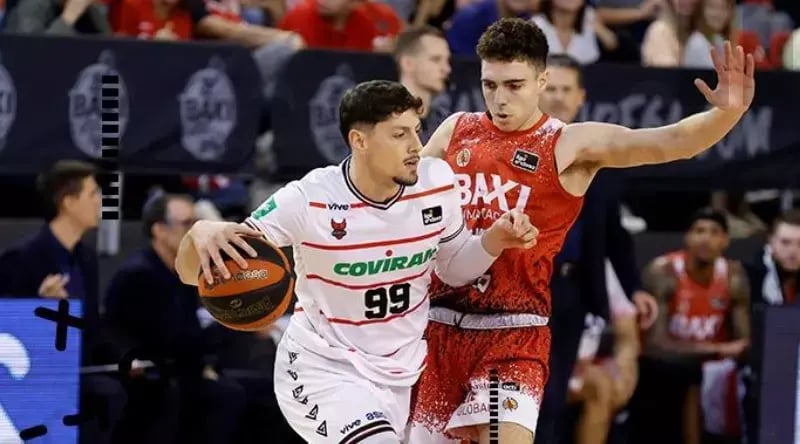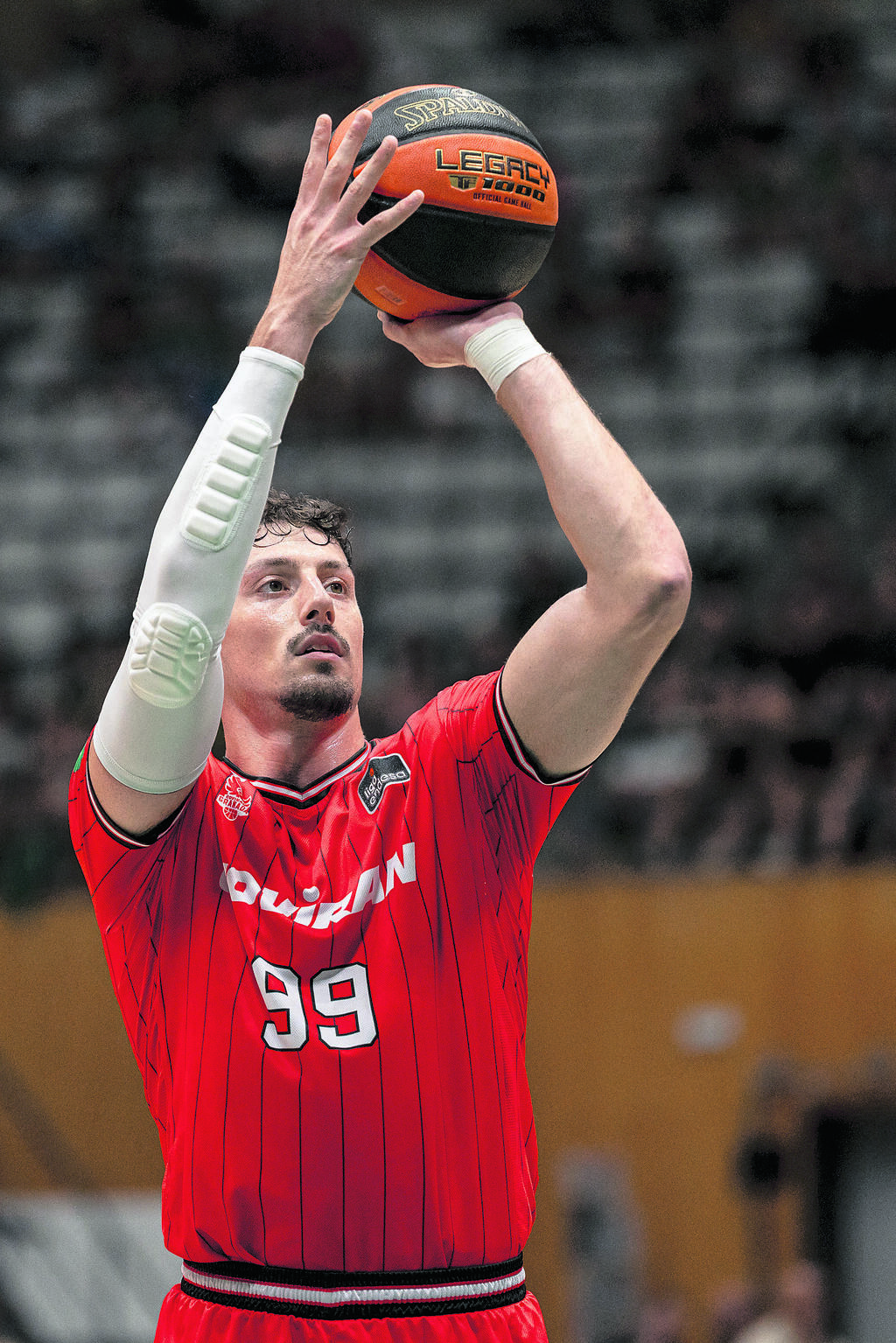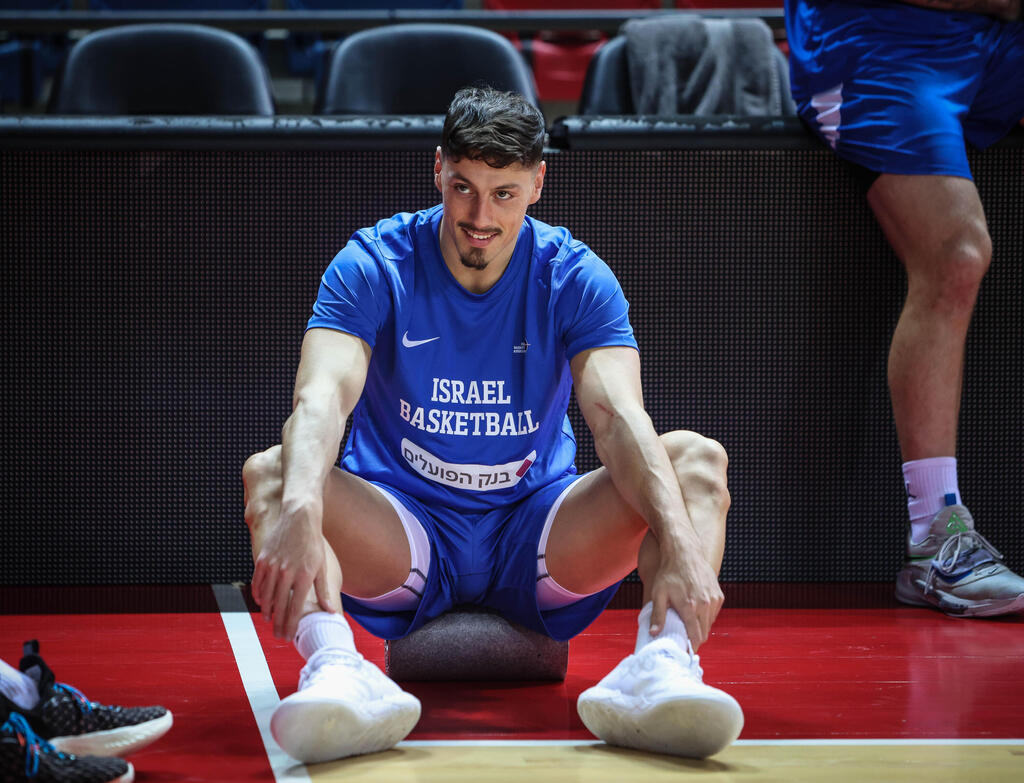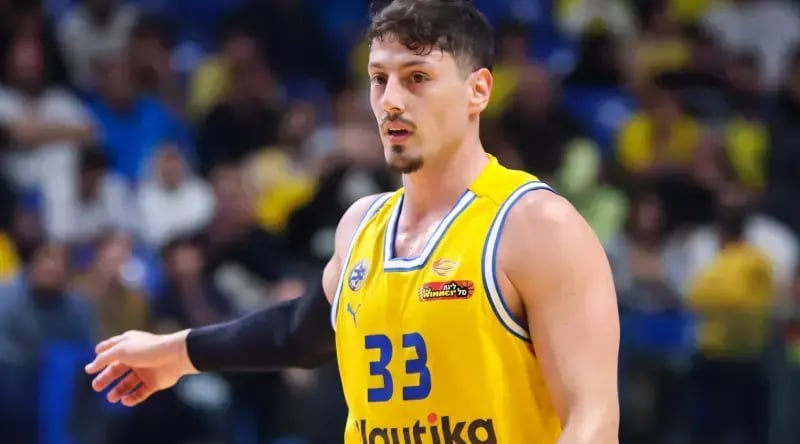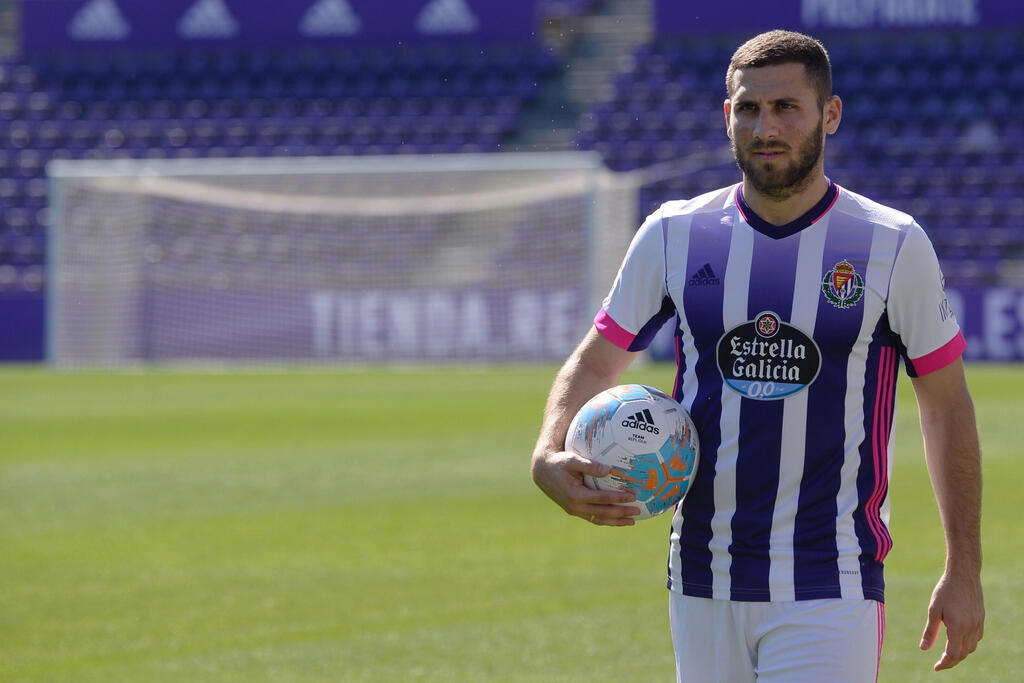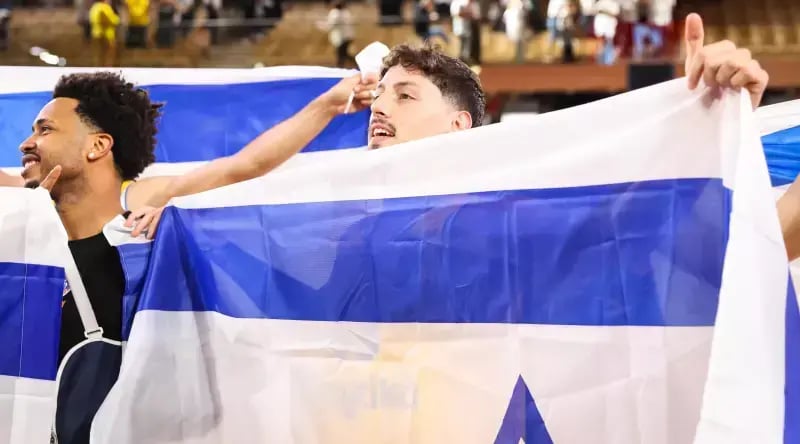Yiftach Ziv returned to Israel after playing in the Spanish league for a short time. The beginning of his European career went well until October 7 turned his world upside down, like many Israelis. Months after returning to Israel, he told Ynet about his experiences and the antisemitism he was subjected to.
More stories:
What began as hope for a new chapter in his career turned into a nightmare that Ziv describes as "abuse." Ignored by the coach, sidelined, excluded from the squad, and ostracized led him to leave the club. Only now, two months after leaving Spain and finding a new home in Saint-Quentin, France, he had the courage to talk about what he had gone through.
The Israeli point guard, 28, started the season with the upper hand, after appearing for 34 minutes in the opening game of the Spanish league, scoring 12 points and 6 assists. On October 6, he received another 24 minutes against Baskonia, and since then everything has fallen apart. In the following three games, his time on the court dropped to an average of 12 minutes and it only got worse. Since October 29, Ziv has not been involved with Granada: initially warming the bench, then excluded from the squad.
"They weren't interested in me at all," he said. "I came to Granada to be a leading player, and at the beginning of the season, it was really like that," he says. "I had good games. We weren't the best in the Spanish league, but we competed well against top teams. I was very happy at first, but from October 7, I went through a very unpleasant period, both professionally and personally."
Did you feel antisemitism?
"Not to the extent that I experienced something, but you're afraid to speak Hebrew on the street. You keep looking right and left. The biggest problem was that the team simply did not support me; they abandoned me."
How did that come to be?
"The most basic thing: war broke out, and no one ever asked me 'how are you?' or 'how is your family?' They weren't interested in me at all. We weren't winning at that time, and I thought to myself how I do things differently, but in hindsight, I realized it wasn't related to basketball. They came to the decision that they simply didn't want me."
Because you're Israeli?
"Yes. No one directly told me that, but that was my feeling. It's unreasonable that from October 7, no one talked to me. I'm a foreign player. Whether I was good or bad, someone should have said something. The coach could have taken me for a talk and said 'pull yourself together.' Even that didn't happen. I felt like air. It's very hard to come like this to practice, especially in basketball. I thought about the family and the captives. I'm sitting in Spain and my thoughts are with a 12-year-old girl sitting in a bomb shelter or a tunnel in Gaza."
Is it because you were alone there?
"Luckily, in the first month of the war, my girlfriend, Kim (Or Azulay, a social media influencer), was with me. She felt that I wasn't doing well mentally. After she returned to Israel, I stayed there alone for a month and a half. I was at a workplace that didn't care about me, they didn't let me play, they separated me from the team's practices. They made me feel like they wanted to cut me out, but they didn't have a reason to do it."
"They tried to say it was professional, but it's funny. Two days before October 7, the coach sat with me and said, 'You have an average of 10 points and 6 assists, you look good.' Then he showed me how I could improve and said they're patient. Does it make sense that two days later he doesn't ask how I am and doesn't talk to me at all? There is no doubt that it's because I'm Israeli and Jewish. They simply ostracized me. It left a scar on me because it was the first time I went to Europe, and I was looking forward to it."
'Never leaving the house'
Was there a moment when you thought, What am I doing here?
"Definitely. The issue of returning to Israel came up in my late-night conversations with myself before going to sleep. I come from a family where everyone is in the army. My dad, 61, who was a lieutenant colonel in the Home Front Command, went up the ranks and volunteered for reserves. My brother and six cousins, each in a different unit in the reserves. I come from a very Israeli family, and I never felt comfortable as an athlete. Suddenly I asked myself, 'Why basketball?' I'm going to practice while my cousin is in Gaza."
What reaction did you receive from the audience?
"A week after October 7, we had a game in Bilbao. Everyone remembers what happened to Hapoel Holon there. I spoke with the team manager and told him that we are going to a place where I don't feel comfortable and they should check if security is needed. They arranged for a police escort. I said to myself: 'Wow, the team cares.' Later, I found out that the club president said in an interview that unfortunately, because there is an Israeli player on the team, they did not feel secure. Then I realized that they brought the police escort for themselves and their security, not for me."
And what did you do alone for a month and a half? Weren't you afraid?
"Luckily, I had Shon Weissman there, who played for the city's football team. He was there with his wife and their two children. Shon went through even tougher things than me because soccer is a bigger deal in Spain. We became a family, meeting every day. They were also in an uncomfortable situation, not leaving the house, so we were just together. He experienced abuse from the crowd there, and I experienced the same thing, so we had something in common. In such a situation, the connection between Israelis is stronger than anything else. Besides, I kept my Jewish identity modest. We spoke English on the street because there were pro-Palestinian protests."
After leaving Granada, you had offers from big teams in Israel. Why didn't you come back?
"I felt like I didn't finish my time abroad, although I really wanted to be in Israel because of the situation. I really wanted to play in Europe, and I felt I needed to recover from everything I went through in Granada. I realized I had gone through a mental shock, a kind of abuse in my first attempt in Europe. Before moving to Saint-Quentin, I spoke with the coach and told him that I want to enjoy this and feel good. He said to me, 'Wait, before basketball, how are you? How's the family?' I told him he gained points just for that."
"Our reserves"
Ziv is currently with the Israeli national team in the EuroBasket qualifiers. On Thursday, he scored four points in a winning match against Portugal, and on Sunday night they will host Slovenia.
"I can't explain how excited I am to be with the national team," he says. "To meet friends, hear Hebrew, play basketball Israeli style, especially after all this time. I waited for it. The moment I met everyone, I had a huge smile, I was so happy. We had a ceremony with the team and I wore the shirt with the inscription 'Bring them home.' It's something I really wanted to do."
Over the years, your relationship with the Israeli national team has been rocky. How do you see your role?
"At this time, the national team is our reserves. My cousin told me he's on some mountain in the north, doing guard duty so I can continue playing basketball. That's a sentence I'll never forget. The little we can do is to represent Israel, to give back. I've had coaches come and go, and there were times when I didn't dress or play, I've been through everything with this national team, and that's what brought me to where I am today. I feel a part of it and want to contribute as much as possible. Whenever they tell me to join the national team, I'm the first to stand up for the flag."
You arrived at Maccabi Tel Aviv with quite an ego. Do you think the two years you spent there and the recent period helped you mature?
"I think it's a process. I chose a very public life because I am a high-level athlete and in a relationship with someone famous and successful. I'm a bit different in the classic basketball landscape, less afraid, maybe a bit more aggressive and with a bit more pride than other Israelis. But I'm very different from the player I am. On the court, I can be a killer, but on the other hand, I don't necessarily expose my true self. I'm very reserved and a bit indifferent, and it's hard to get me off balance. Recently, and also at Maccabi, I didn't find my balance, and that's something I need to get back to, the killer instinct that set me apart from other players."
Granada responded: "Pablo (Pin) gave him time and was patient with him, but during the first three days it was clear that he had not reached the level that we expected to be the team's starting point guard. Now we know that he was not going to get there due to the situation being so complicated and difficult to understand. we are not in his shoes but we try to treat him kindly."



